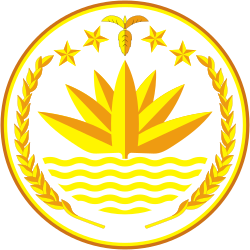May 1965 | ||||||||||||||||
150 of the 155 seats in the Provincial Assembly | ||||||||||||||||
|---|---|---|---|---|---|---|---|---|---|---|---|---|---|---|---|---|
| ||||||||||||||||
 |
|---|
Provincial Assembly elections were held in East Pakistan in 1965 as part of the wider provincial elections.
May 1965 | ||||||||||||||||
150 of the 155 seats in the Provincial Assembly | ||||||||||||||||
|---|---|---|---|---|---|---|---|---|---|---|---|---|---|---|---|---|
| ||||||||||||||||
 |
|---|
Provincial Assembly elections were held in East Pakistan in 1965 as part of the wider provincial elections.
The 1962 constitution provided for an indirectly elected 155-seat Provincial Assembly, of which 150 seats were elected from single-member constituencies by electoral colleges under the "basic democracy" system, and five seats reserved for women, who were elected by the 150 elected members divided into five constituencies. [1] In East Pakistan there were 40,000 members of the electoral college. [2]
The electoral college members were elected on 21 November 1964. [3]
After around 900 potential candidates submitted nomination papers, [4] a total of 666 candidates contested the elections, with two constituencies returning a single candidate unopposed. [5]
Around half of the independents elected were backed by opposition parties. [4]
| Party | Votes | % | Seats | |
|---|---|---|---|---|
| Convention Muslim League | 14,144 | 37.99 | 66 | |
| Awami League | 5,863 | 15.75 | 11 | |
| National Awami Party | 4 | |||
| Council Muslim League | 3 | |||
| National Democratic Front | 3 | |||
| Jamaat-e-Islami Pakistan | 1 | |||
| Nizam-e-Islam Party | 1 | |||
| Other parties | 942 | 2.53 | 0 | |
| Independents | 16,284 | 43.74 | 58 | |
| Vacant | 3 | |||
| Total | 37,233 | 100.00 | 150 | |
| Source: Al-Mujahid | ||||